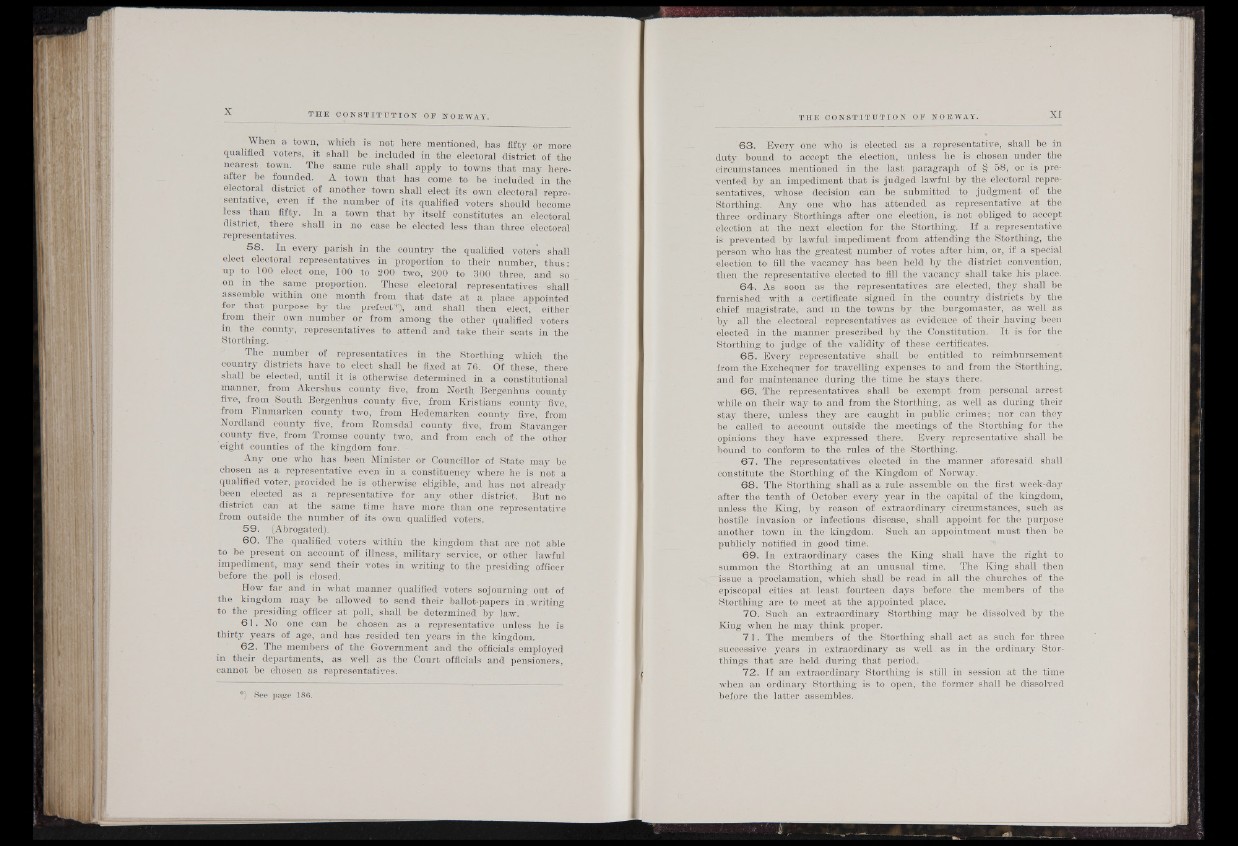
When a town, which is not here mentioned, has fifty or more
qualified -voters, it shall be. included in the electoral district of the
nearest town. The same rule shall apply to towns that may hereafter
be founded. A town that has come to be included in the
electoral district of another town shall elect its own electoral representative,
even if the number of its qualified voters should become
less than fifty. In a town that by itself constitutes an electoral
district, there shall in no ease be elected less than three electoral
representatives.
58. In every parish in the country the qualified voters shall
elect electoral representatives • in proportion to their number, thus:
up to 100 elect one, 100 to 200 two, 200 to .300 three, and so
on in the same proportion. These electoral representatives shall
assemble within one month from that date at a place appointed
for that purpose by the prefect*), and shall then elect, either'
from their own number or from among the other qualified voters
in the county, representatives to attend and take their seats in the
Storthing.
The number of representatives in the Storthing which the
country districts have to elect shall be fixed at 76, Of these, there
shall be elected, until it is otherwise determined in a constitutional
manner, from Akershus county five, from North Bergenhus county
five, from South Bergenhus county five, from Kristians county five,
from Finmarken county two, from Hedemarken county five, from
Nordland county five, from Romsdal county five, from Stavanger
county five, from Tromso county two, and from each of the other
eight counties of the kingdom four.
Any one who has been Minister or Councillor of State may be
chosen as a representative even in a. constituency where he is not a
qualified voter, provided he is otherwise eligible, and has not already
been elected as a representative for any other district: But no
district can at the same time have more than one representative
from outside the number of its own qualified voters.
59. (Abrogated).
60. The qualified voters within the kingdom that are not able
to be present on account of illness, military service, or other lawful
impediment, may send their votes in writing to the presiding officer
before the_poll is closed.
How far and in what manner qualified voters sojourning out of
the kingdom may be allowed to send their ballot-papers in.writing
to the presiding officer at poll, shall be determined by law.
61 . No one can be chosen as a representative unless he is
thirty years of age, and -has resided ten years in the kingdom.
62. The members of the Government and the officials'employed
in their departments, as well as the Court officials and pensioners,
cannot be chosen as representatives.
63. Every one who is- elected as a representative, shall be in
duty bound to 'accept the election, unless he is chosen under the
circumstances mentioned in the last paragraph of § 58, or is prevented
by an impediment that is judged lawful by the electoral representatives,
whose decision can be submitted to judgment of the
Storthing. Any one who has attended as representative at the
three ordinary-Storthings after one election, is not obliged to accept
election at the next election for the Storthing. If a representative
is prevented by lawful impediment from attending the Storthing, the
person who has the greatest number of votes after him, or, if a special
election to fill the vacancy has been held by the district convention,
then the representative elected to fill the vacancy shall take his place.
64. As soon as the representatives are elected, they shall be
furnished with a certificate signed in the country districts by the
chief magistrate, and in the towns by, the burgomaster, as well as
by all -the electoral representatives as evidence of their having been
elected in the manner prescribed by the Constitution. It is for the
Storthing to judge , of the validity of these certificates.
65. Every representative shall be entitled to reimbursement
from the Exchequer for travelling expenses to and from the Storthing,
and for maintenance during the time he stays there.
66. The representatives shall be exempt from personal arrest
while on their way to and from the Storthing, as well as during their
stay there, unless they are caught in public crimes; nor can they
be called to account outside the meetings of the Storthing for the
opinions they have expressed there. Every representative shall be
bound to conform to the rules of the Storthing.
67. The representatives elected in the manner aforesaid shall
constitute the Storthing of the Kingdom of Norway.
68. The Storthing shall as a rule/ assemble on the first week-day
after the tenth of October every year in the capital of the kingdom,
unless the King, by reason of extraordinary circumstances, such as
hostile invasion or infectious disease, shall appoint for the purpose
another town in the kingdom. Such an appointment must then be
publicly notified in good time.
69. In extraordinary cases the King shall have the right to
summon the Storthing at an unusual time. The King shall then
issue a proclamation, which shall be read in all, the churches of the
episcopal cities at least fourteen days before the members of the
Storthing are to meet at the appointed place.
70. Such an extraordinary Storthing may be dissolved by the
King when he may think proper.
71. The members of the Storthing shall act as siich for three
successive years in extraordinary as well- as in the ordinary Storthings
that are held, during that period.
72. If an extraordinary Storthing is still in session at the time
when an ordinary Storthing is to open, the former shall be dissolved
before the latter assembles.